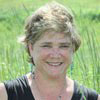In fact, students love the clicker so much, they ask for more math problems.
"Miss, do you have any more problems we can do?"
"Miss, I need a couple more problems, so I can score better than Jay."
Gee, what math teacher wouldn't want THAT problem.
And that story worked magic: her iPad was crowd-sourced and she's setting it up now to work with her clickers.
Storytelling won the day.

Are you a writer, a storyteller, or an author?
Are they the same thing, do the nuances between these words mean little to you?
For me, they are different.
A writer is someone who writes. It can be good or bad, fiction or nonfiction, for private use or for commercial use, for blogs or for magazines. The reason for putting words on a page can vary widely. The key point is that words are being put down.
A storyteller is someone who touches a reader emotionally with a powerful tale. For our purposes, it is a storyteller who writes, rather than tells stories orally or with images.
An author is someone whose written words are published.
Writers and storytellers don't necessarily become authors. Writers don't necessarily share their work with anyone else while they are alive. A storyteller is one type of writer. What type of writer do you want to be? Are you a generic writer, or do you want to be a storyteller? Within the category of storytelling, do you want to specialize in mysteries or historical fiction?
And do any of these distinctions make any difference?
For me, they matter very little. Which probably makes me a writer. I am happy to write nonfiction--such as this blog post--or fiction or any other type of writing. But my favorite type of writing is storytelling. Skills cross the range of writing, but it's the passion that makes a difference. When I am working to tell a story, I work harder and I am more passionate about everything. I care more about putting events into a narrative arc that builds to some emotional climax. I like writing fiction.
Stories are my passion. And they work whether it's on the page or in a math class.
It helps to figure out where your passions lie because then you can focus on what is most important to you.
What kind of writer are you? Are you a storyteller? An Author? a scientist writer? a historian writer, A mystery writer? Where do your passions lie?
----

Darcy Pattison blogs about how-to-write at Fiction Notes and blogs about education at CommonCoreStandards.com Follow Darcy on Pinterest.





2 comments:
I think it is important to define what you are to give yourself some direction and purpose, but not sure if you can only be a writer or an author, etc. Also, maybe because of your math example at the beginning (which is really cool by the way), I was thinking of philosophy/logic statements such as: All authors are writers, but not all writers are authors. All storytellers are writers but not all writers are storytellers, and so on.
Good to know I am not the only person writing school grant writer who starts with a story! :)
I see the difference between write, storyteller, author, but they seem intermingled. I write for a newspaper, some of my articles have a storyteller tone due to the nature of the story. All my work is published so I am an author.
Post a Comment